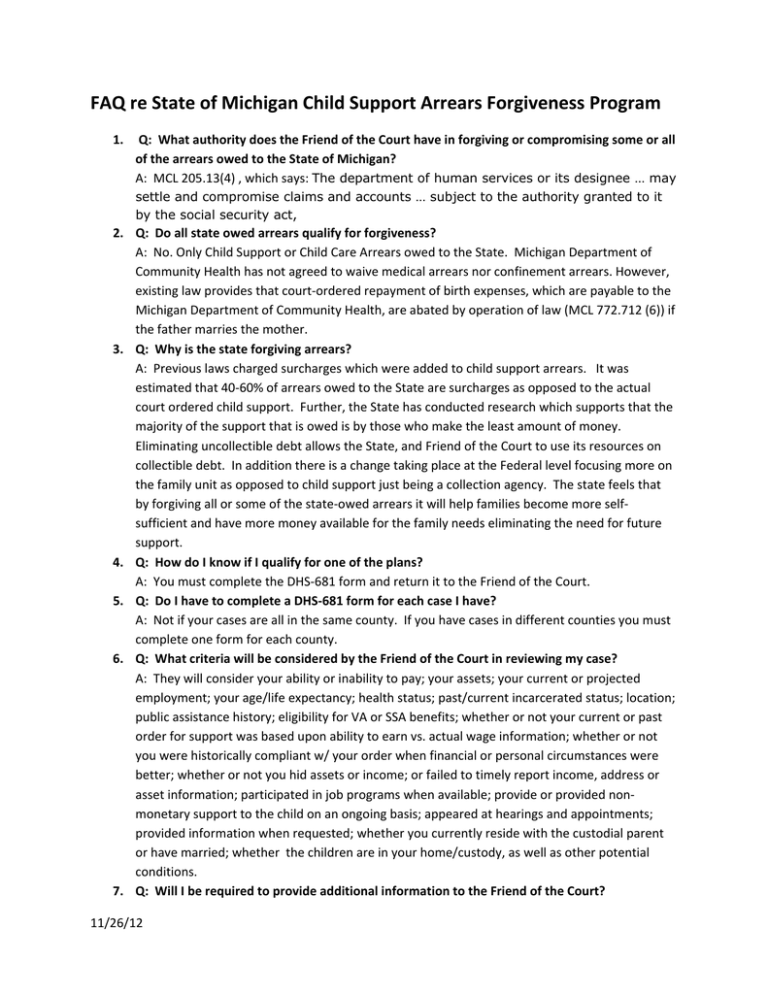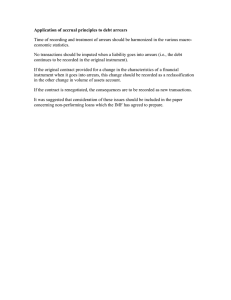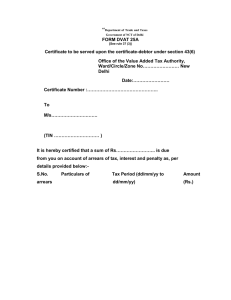FAQ re State of Michigan Child Support Arrears Forgiveness Program
advertisement

FAQ re State of Michigan Child Support Arrears Forgiveness Program 1. Q: What authority does the Friend of the Court have in forgiving or compromising some or all of the arrears owed to the State of Michigan? A: MCL 205.13(4) , which says: The department of human services or its designee … may settle and compromise claims and accounts … subject to the authority granted to it by the social security act, 2. Q: Do all state owed arrears qualify for forgiveness? A: No. Only Child Support or Child Care Arrears owed to the State. Michigan Department of Community Health has not agreed to waive medical arrears nor confinement arrears. However, existing law provides that court‐ordered repayment of birth expenses, which are payable to the Michigan Department of Community Health, are abated by operation of law (MCL 772.712 (6)) if the father marries the mother. 3. Q: Why is the state forgiving arrears? A: Previous laws charged surcharges which were added to child support arrears. It was estimated that 40‐60% of arrears owed to the State are surcharges as opposed to the actual court ordered child support. Further, the State has conducted research which supports that the majority of the support that is owed is by those who make the least amount of money. Eliminating uncollectible debt allows the State, and Friend of the Court to use its resources on collectible debt. In addition there is a change taking place at the Federal level focusing more on the family unit as opposed to child support just being a collection agency. The state feels that by forgiving all or some of the state‐owed arrears it will help families become more self‐ sufficient and have more money available for the family needs eliminating the need for future support. 4. Q: How do I know if I qualify for one of the plans? A: You must complete the DHS‐681 form and return it to the Friend of the Court. 5. Q: Do I have to complete a DHS‐681 form for each case I have? A: Not if your cases are all in the same county. If you have cases in different counties you must complete one form for each county. 6. Q: What criteria will be considered by the Friend of the Court in reviewing my case? A: They will consider your ability or inability to pay; your assets; your current or projected employment; your age/life expectancy; health status; past/current incarcerated status; location; public assistance history; eligibility for VA or SSA benefits; whether or not your current or past order for support was based upon ability to earn vs. actual wage information; whether or not you were historically compliant w/ your order when financial or personal circumstances were better; whether or not you hid assets or income; or failed to timely report income, address or asset information; participated in job programs when available; provide or provided non‐ monetary support to the child on an ongoing basis; appeared at hearings and appointments; provided information when requested; whether you currently reside with the custodial parent or have married; whether the children are in your home/custody, as well as other potential conditions. 7. Q: Will I be required to provide additional information to the Friend of the Court? 11/26/12 8. 9. 10. 11. 12. 13. 14. 15. A: You may be asked to provide proof of one or all of the items as indicated on the DHS‐681 form. In addition, someone may call you or ask you to appear for an in office interview. Q: If I don’t qualify for the arrears forgiveness program, will I qualify for another program? A: You may qualify for a lump sum program where the state will agree to forgive an equal amount of any state arrears with a minimum payment of $1000. If you qualify for the lump sum program, you will be required to complete a DHS‐682 form and return it to the FOC. You may always file a motion seeking a payment plan in exchange for dismissal of state arrears. Q: Does my bond; tax intercept; or lien/levy on an asset or account count as a lump sum payment if qualified for that program? A: No. Only payments that are made directly by you will be considered if you are approved for the lump sum program. Q: How long will it take to for the Friend of the Court to determine if I am eligible? A: We expect you should have a determination within 30 days from the time your completed DHS 681 is received in the office. Q: Do I have to continue to pay my support and arrears while I am waiting for a decision? A: YES. This is not a required program, and until such time as it is determined your arrears may be forgiven, you are still court ordered to comply. Q: Is the Friend of the Court mailing letters to those who qualify? A: The Friend of the Court may mail out letters to people whose cases have been identified as potentially qualifying, or they may hand out forms in the office. Other agencies that interact with people who owe child support may also refer them to the Friend of the Court. Q: What if I have a warrant for child support? Will that prevent me from participating? A: No. We may be able to assist you in resolving your warrant during this process. Do not wait to resolve your warrant, however, if you are waiting to hear the outcome of your application. At your bench warrant hearing, you may ask the referee handling the disposition of your warrant if you qualify for any of the arrears forgiveness programs. Q: What if I cannot read/write, will someone be able to assist me in completing the forms? A: We suggest you find a family member or close friend to assist you in completing the form. Q: Where can I find or obtain forms? A: You can contact your Domestic Support Specialist to ask for the DHS‐681; obtain it from our website; or pick one up in the lobby. 11/26/12


